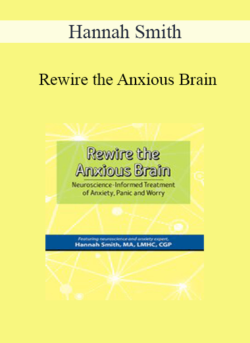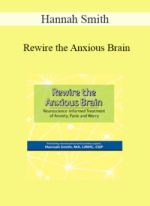[Instant Download] – Immediately deliver the download link after receiving the paymentPurchase Hannah Smith – Rewire the Anxious Brain: Neuroscience-Informed Treatment of Anxiety, Panic and Worry courses at here with PRICE $219.99 $41Faculty:Hannah SmithDuration:6 Hours 6 MinutesFormat:Audio and VideoCopyright:May 06, 2020 Manual – Rewire the Anxious Brain (12.8 MB) 112 Pages Available after Purchase Illinois Educators Self-study Instructions (28.5 KB) Available after Purchase Illinois Educators Evaluation Form (1.2 MB) Available after Purchase OutlineUse Neuroscience in the Treatment of AnxietyPositives:We know more about anxiety-based disorders than any other disordersScience gives explanations, evidence, authority, destigmatizes difficultiesConcerns:It can be difficult to explain, answer questionsClients may feel a lack of responsibilityOversimplification is inevitableEnhancing Engagement in TreatmentDon’t neglect the therapeutic relationship!Address the challenges of anxious clientsRemember that strategies are effortfulGuide the process using client’s goalsMaintain motivationNeuroplasticityDefine Neuroplasticity in everyday languageTherapy is about creating a new self”Rewiring” as an accessible concept for changeRe-consolidation: the modification of emotional memoriesIdentify Two Neural Pathways to AnxietyAmygdala – bottom-up triggering of emotion, physicality of anxietyCortex – top-down emotion generation based in cognitionExplain the two pathways to clientsHow anxiety is initiated in each pathway and how pathways influence each otherClient Friendly ExplanationsUse illustrations to create concrete understandingFight/flight/freeze responsesThe “language of the amygdala”Anxiety and the cortexHelp clients recognize the two pathways to anxietyNeuroplasticity in the Amygdala (Essential for all Anxiety Disorders, PTSD, OCD, Depression) Sleep and the amygdalaThe influence of exerciseBreathing techniques to reduce activationRelaxation, meditation, and yoga to modify responsesExposure as opportunities for the amygdala to learnCombatting avoidanceWhen anxiety indicates that the amygdala can learn new responsesPush through anxiety to change the amygdalaNeuroplasticity in the Cortex (Essential for GAD, SAD, OCD, PTSD, Depression) ”Survival of the busiest” principle – strengthen or weaken specific circuitryThe healthy (adaptive) use of worry in the cortex”You can’t erase: You must replace”Recognize and modify the impact of uncertaintyTraining correct uses of distractionLeft hemisphere techniques – cognitive defusion, coping thoughts, fighting anticipationRight hemisphere techniques – imagery, musicMindfulness and anxiety resistancesNeuroplasticity and Medications for Anxiety Disorders, OCD, PTSD, Depression Medication’s effects in the rewiring processThe myth of the chemical imbalanceThe danger of sedating the brain with benzodiazepinesPromoting neuroplasticity with SSRIs, SNRIsThe effectiveness of CBT and medsMoving Beyond Diagnostic Categories to Focus on Anxiety Pathways Anxiety is a component of many diagnoses (depression, substance abuse, etc.)Amygdala – and cortex-based techniques help in other disordersTargeting brain-based symptoms rather than disordersWorry, obsessions, rumination respond to similar cortex-based techniquesPanic, phobic responses, and compulsions respond to amygdala-based techniquesResearch, Risks and LimitationsEmpirical versus clinical and anecdotal evidenceClinical considerations for specific clients and settingsEfficacy of particular interventions may varyFaculty Hannah Smith Related seminars and products: 2 Potential FindersHannah Smith, MA, LMHC, CGP, is the founder of Potential Finders and is the group therapy program coordinator in a top partial-hospital rehabilitation treatment center in the Seattle area. She holds Masters degrees in both special education and counseling psychology and has nearly 20 years of experience both in the US and abroad. Her educational work has been with disorders of cognition and communication, where the role of the brain in learning and memory were primary areas of focus. Clinically, her practice is primarily devoted to the treatment of people recovering from trauma and anxiety disorders. Her experience, both personally and professionally, has allowed her to develop an expertise in incorporating neuroscience into therapeutic interventions in innovative ways. Hannah guest lectures in academic and clinical settings on a variety of topics related to neuroscience and the treatment of anxiety, trauma, and emotion regulation. She is an engaging presenter whose passion is to educate clinicians on practical, whole-person approaches and applications in therapy.Speaker Disclosures:Financial: Hannah Smith is the clinical supervisor at The Center; A Place of Hope. She receives a speaking honorarium from PESI, Inc.Non-financial: Hannah Smith has no relevant non-financial relationship to disclose. Salepage: https://catalog.pesi.com//item/rewire-anxious-brain-neuroscienceinformed-treatment-anxiety-panic-worry-59804Archive: https://archive.ph/wip/PK09MPurchase Hannah Smith – Rewire the Anxious Brain: Neuroscience-Informed Treatment of Anxiety, Panic and Worry courses at here with PRICE $219.99 $41
Hannah Smith – Rewire the Anxious Brain: Neuroscience-Informed Treatment of Anxiety, Panic and Worry
₹6,806.00




